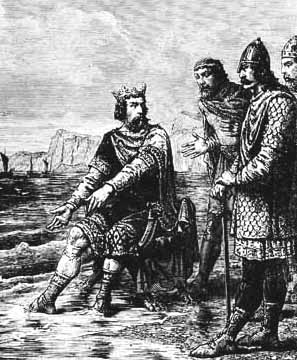 |
Stories & Legends
The Humility of King Canute
Hugh O’Reilly
The famous story of King Canute of England commanding the waves is told by chronicler Henry of Huntingdon, who lived within 60 years of the death of Canute (1035 AD). He tells his readers that he collected information for this event and others from eye-witnesses still living. The encounter with the waves took place at Bosham in West Sussex.
When the English King Canute (also known as Knut or Cnut) had reigned for twenty years, he died at Shaftesbury and was buried in the ancient monastery at Winchester. About the power of this King a few particulars should be stated, because before him no English King ever had such wide-ranging authority. For he was at once the lord of all England, of all Denmark, of all Norway, and also of Scotland.

King Canute commands the waves to stop |
Indeed, apart from a number of wars in which he gained so much glory, his nobleness and greatness of mind were eminently displayed on three occasions:
First, when he married his daughter to the Roman Emperor Henry III with unutterable splendor.
Second, when, during his journey to Rome he arranged a reduction of the oppressive toll dues exacted from pilgrims on the roads that led though Gaul to Rome, one half of them at his private expense.
Third, when at the summit of his power, he ordered a seat to be placed for him on the sea-shore when the tide was coming in. Then, before a large group of his flattering courtiers, he spoke to the rising sea, saying, "Thou, too, art subject to my command, for the land on which I am seated is mine, and no one has ever resisted my commands with impunity. I command you, then, o waters, not to flow over my land, nor presume to wet the feet and the robe of your lord."
The tide, however, continued to rise as usual, dashing over his feet and legs without respect to his royal person.
Then the King leaped backwards, saying: "Let all men know how empty and worthless is the power of kings, for there is none worthy of the name, but He whom heaven, earth, and sea obey by eternal laws."
Thenceforth King Canute never wore his crown of gold, but placed it for a lasting memorial on a statue of Our Lord nailed to the Cross, to the honor of God the Almighty King, through whose mercy may the soul of Canute, the King, enjoy everlasting rest.

Selected from The Chronicle of Henry of Huntingdon,
Translated by Thomas Forester, London: Woodfall & Kinder, pp. 198-199.
Posted November 27, 2010


Related Topics of Interest
 The Old Woman, the Butcher & the Captain The Old Woman, the Butcher & the Captain
 How a Mule ‘Adored’ the Blessed Sacrament How a Mule ‘Adored’ the Blessed Sacrament
 The King and the Blessed Sacrament The King and the Blessed Sacrament
 The Tumbler of Our Lady The Tumbler of Our Lady
 The Man Who Sold His Soul to the Devil The Man Who Sold His Soul to the Devil
 The Medieval Fish The Medieval Fish
 The Royalty of Christ the King The Royalty of Christ the King

Related Works of Interest
| |
|
Legends | Religious |
Home | Books | CDs | Search | Contact Us | Donate

© 2002-
Tradition in Action, Inc. All Rights Reserved
|
 |
|